Central government pivots to strong real estate push in 2023 to propel economic recovery
Property sales have close correlation to economic growth: expert

real estate Photo:Xinhua
The property sector is a livelihood-related industry in China, and the release of housing consumption will help promote the virtuous circle of the key sector, to further push the overall development of the economy next year, Chinese experts said.
In response to media questions about the tone-setting Central Economic Work Conference, the office said that the country should focus on improving expectations, expanding market demand and supporting the demand for housing improvement, and abiding by the principle of “houses are for living in, not for speculation.”
To stabilize economic growth, the key meeting, which concluded on Friday, vowed support for housing sector development, new-energy vehicles and elderly care consumption.
But some restrictive policies that prevent the release of pent-up consumption still exist, the office noted, vowing to encourage the increase of the supply of guaranteed rental housing and reasonably increase consumer credit.
“Housing consumption should become a potent part of domestic consumption growth in 2023, while the emphasis on the importance of the real estate sector will help stabilize consumers’ expectations,” Cao Heping, an economist at Peking University, told the Global Times on Monday.
Cao noted that the current adjustments in the property market are essential, and the housing needs of people of different income levels need to be considered.
Song Ding, a research fellow at the Shenzhen-based China Development Institute, said that the largest share of residential consumption is housing consumption, so boosting housing demand can achieve the goal of revitalizing domestic market.
This year, the government has implemented measures to stabilize the property market to ensure the delivery of residential buildings as well as meet the reasonable financing needs of property developers.
For instance, the regulators have released “three detailed policies” to revive the housing market, which involved three rounds of bailouts that featured loan extensions, bond financing as well as the resumption of mergers and acquisitions by real estate developers and refinancing by publicly traded real estate companies.
According to the officials from the office, the government will study measures to promote the healthy development of the real estate industry, including improving basic systems of real estate-related fields like land, taxation and finance, in a bid to phase in healthy real estate sector growth.
Cao noted that the property sector should focus on a new pattern of development that involves digital technology and construction of smart cities.
The central economic conference has set a clear tone for next year's real estate sector development, which stress the demand side and risk prevention, in addition to a focus on the supply side, according to Yan Yuejin, research director at Shanghai-based E-house China R&D Institute.
Song predicted that in 2023, more policies to stimulate housing consumption will be worked out.
The office said that in recent months, China's real estate market has seen an accelerated decline, which has become a major risk factor affecting the operation of the national economy. Experts noted that with the implementation of optimized anti-COVID-19 measures and policies to invigorate the property market, the sector will see rapid growth next year.
“In the second quarter of next year, China’s economy will likely rebound, and the unemployment situation will be alleviated while residents' ability to repay loans and consume will be enhanced, so the real estate industry will realize a virtuous cycle,” Song told the Global Times.
Yan noted that the recovery of the sector can actually serve as the engine of an economic recovery, as active demand for housing will drive related industries including home appliances and construction materials.
“The real estate sector can contribute at least one-quarter of the pull to China’s GDP growth in 2023,” Yan said.

